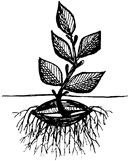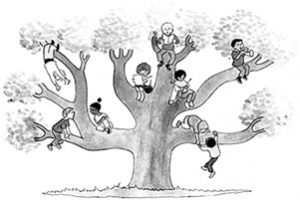Sunday before Lent – Exodus 34: 29-end, Luke 9: 28-36
I wonder if you have ever tried to have a conversation with someone who was wearing a head torch? It is not possible to look them in the face, as the torch completely blinds you as I once discovered. It seems that the people of Israel and Peter, James and John had a similar experience in our two bible readings.
Last week with Alison, we looked at part of the second narrative of the creation. This week our Old Testament reading is the account of the second time that Moses went up to Mount Sinai to receive the commandments from God. You will recall that after the first occasion he came down from the mountain and found that the people had given him up for lost, and thinking that God had deserted them. had persuaded Aaron to make a golden calf for them to worship. When Moses returned, he found them in a frenzy of worship to the calf and in his anger, he smashed the tablets of the law that he had brought down. That part of the story doesn’t end well, but Moses was able to persuade God to allow the people a second chance, and so he climbed the mountain again. On this occasion Moses has made a further request of God – that he might be allowed to see him. Perhaps after the trauma of the first occasion Moses needed God to reinforce his calling. Whatever the reason, God explains that to look Him in the face would be more than anyone could bear, but he allows him to hide in a crack in the rock while God goes by. God protects him by covering him with his hand until He has passed, but allows Moses to see his glory when he has passed. When Moses descends the mountain again, he learns from the reaction of the people that just being that close to God has made his face shine so that they cannot bear to look at him, and he wears a veil to cover this.
Starting on Wednesday, we shall be looking in all our reflections on various parts of the Lord’s prayer. Like so many of the gospel readings recently this is something that appears both in Matthew’s and Luke’s gospels, and in Luke’s version Jesus gives the prayer in answer to a request from the disciples – in Luke chapter 11 the disciples find Jesus praying and ask him to teach them how to pray. That request ‘Lord teach us to pray’ from Luke 11 v1 could well be our text for today to lead into Lent, as it was when Jesus was praying that the disciples saw him transfigured in this glorious way. This experience obviously stayed with them very clearly, as it is reported in Matthew’s, Mark’s and Luke’s gospels, and there is very little difference in the detail in all three versions. Shortly after it has happened, when they descend the mountain again, they find the rest of the disciples in some distress as they have been unable to heal a boy brought to them by his distraught father. After Jesus has healed the boy and the crowds have left, they ask him why they were unable to and his answer, as given in Mark’s gospel is that it could only be done with much prayer. No wonder the disciples asked for instructions.
The prayer that Jesus gives us is very short – even the longer version from Matthew’s gospel said quite slowly takes less than a minute to say. I don’t think for a moment however that Jesus intended our prayers to begin and end there. I am becoming more and more convinced that our most effective prayer – and perhaps the one that just might bring us nearer to the state of having shining faces gets its theme from a country song (written by Paul Overstreet and Don Schiltz) that was a hit for Ronan Keating and featured in the film Notting Hill – ‘You say it best when you say nothing at all’. We used to begin our Sunday worship with sentences from scripture – as we still do at funeral services, and one that I remember hearing often on a Sunday morning is from James 4: v8 ‘Come close to God and He will come close to you’. Both Moses and Jesus knew this as we saw from our readings.
Silence is an increasingly rare commodity these days. I am often vaguely irritated when I see people out and about wearing earpieces. I am sure that listening to music helps them to exercise, and audio books are a good way to experience literature, but you cannot hear the birds sing, the sound of the wind in the trees or the water going over the waterfall with them in. Not to mention the call of a friend nearby or the sound of a motor that would like them to move out of the way! I wonder if more people would be concerned about the degree to which birdsong and population has declined recently if they took out their earpieces to listen.
We have a monthly meeting in Wincanton that I value greatly – it happens usually on the first Monday of the month in the Baptist Church, and is called a Julian meeting after Dame Julian of Norwich. At 10.30 after a short chat together, we light a candle and listen to a short reading which we take turns to bring, and then move into a time of silence for half an hour before a short prayer of blessing and we go our separate ways. Put like that it sounds a bit pointless, but it is a real opportunity to be in an attitude of prayer with others who are doing the same, and to just relax in the presence of God. If you would like to attend, you would be very welcome, and I am happy to talk to anyone more about this. Or perhaps you might like to try spending more time in silence as part of your Lent observance to see if you can be more aware of God’s loving presence.
I would like to finish today with a short, guided meditation that was given to me at the end of my Exploring Spirituality course and which I find useful in stilling and centring my mind on God. I hope that you do to.
If you are reading this at home, do try the meditation which is on a separate sheet – you will need to find somewhere quiet to sit comfortably, relax and concentrate for a moment or two on being aware of your breathing before reading it slowly. Click Here: Meditation Be Still



